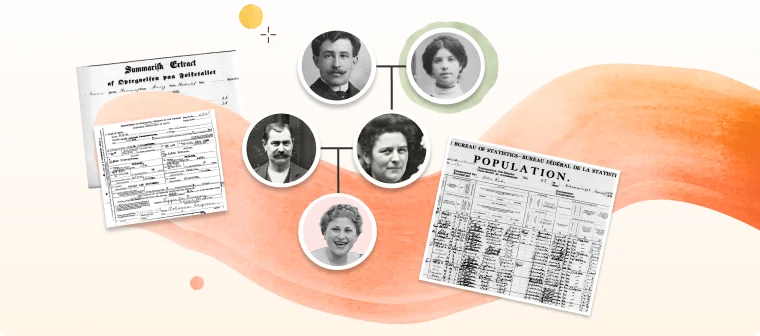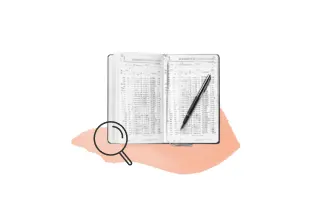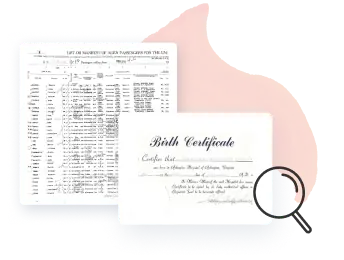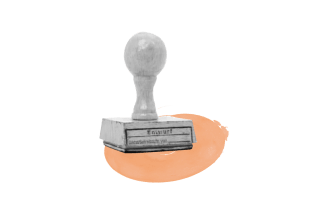Name Directory by Last Name: Last Names Starting with Za
Explore millions of names to discover rich genealogical details and uncover your family's history
Enter a name to research
Last name meanings and origins
- Zamora
The surname Zamora has its historical roots in Spain, particularly associated with the city of Zamora in the northwest region of the country. The name is derived from the Arabic word "al-Samura," which means "the place of the wild plum," reflecting the region's agricultural heritage.
- Zahn
The surname Zahn has its roots in the German language, deriving from the Middle High German word "zan," which means "tooth." This surname likely originated as a nickname for someone with notable dental features or perhaps as a metonymic occupational name for a tooth carver or dentist. The earliest records of the surname can be traced back to the medieval period in Germany, where surnames began to be adopted more widely.
- Zapata
The surname Zapata has its historical roots in Spain, particularly in the region of Castile. The name is derived from the Spanish word "zapata," which translates to "shoe" or "sandal," suggesting that the original bearers of the surname may have been shoemakers or had some connection to the footwear trade.
- Zander
The surname Zander has its historical roots primarily in Germany and the Netherlands, where it is derived from the Middle High German word "sander," meaning "defender" or "protector." The name likely emerged in the medieval period, around the 12th century, as a patronymic surname, indicating lineage or descent from a notable ancestor. Over time, individuals bearing the surname Zander often engaged in various occupations, including farming and craftsmanship, reflecting the agrarian and artisanal societies of the time.
- Zavala
The surname Zavala has its historical roots in Spain, particularly in the region of Castile. It is derived from the Basque word "zabala," meaning "wide" or "broad," which may have originally referred to geographical features or characteristics of the land.
- Zarate
The surname Zarate has its historical roots in the Basque region of Spain, particularly in the province of Gipuzkoa. The name is believed to derive from the Basque word "zar," meaning "rock" or "stone," which may indicate a geographical feature or a characteristic of the land where the original bearers lived.
- Zakharov
The surname Zakharov has its roots in Eastern Europe, particularly within Russian and Ukrainian cultures. It is derived from the given name Zakhar, which itself comes from the Hebrew name Zechariah, meaning "the Lord has remembered." The surname likely emerged in the medieval period, as patronymic naming conventions became prevalent in Slavic societies, where surnames were often formed by adding suffixes to the father's name.
- Zabel
The surname Zabel has its roots in various European cultures, particularly in German and Jewish communities. Historically, the name is believed to derive from the Hebrew name "Zevulun," which means "dwelling" or "habitation," and is associated with one of the tribes of Israel.
- Zane
The surname Zane has its historical roots primarily in the English and Hebrew languages. In English, it is often considered a variant of the surname "Zain," which is derived from the Old French "Zane," meaning "gift from God." The name can be traced back to medieval England, where it was likely adopted by families in the context of religious or cultural significance.
- Zajac
The surname Zajac has its roots in Slavic languages, particularly deriving from the word "zajac," which means "hare" in Polish and other Slavic languages. This surname likely originated as a nickname for someone who exhibited traits associated with the animal, such as swiftness or timidity, or it may have been linked to a profession related to hunting or trapping.
- Zachary
The surname Zachary has its roots in the Hebrew name "Zekharyah," meaning "the Lord has remembered." It first appeared in historical records during the medieval period, particularly in England, where it was often used as a given name before evolving into a surname. The name became more common in the 12th century, likely due to the influence of biblical texts and the popularity of saints bearing the name.
- Zaytsev
The surname Zaytsev has its roots in Eastern Europe, particularly within Russian and Ukrainian contexts. It is derived from the word "zayats," which means "hare" in Russian, suggesting that the name may have originally been a nickname for someone who was swift or agile, or perhaps a reference to a person involved in hunting or trapping hares.
- Zak
The surname Zak has its roots in various cultures, with notable origins in Slavic and Hebrew traditions. In Slavic contexts, Zak is often derived from the word "zak," meaning "to take" or "to seize," which may have originally referred to a person who was a gatherer or collector.
- Zacharias
The surname Zacharias has its roots in the Hebrew name "Zechariah," meaning "Yahweh has remembered." Historically, it can be traced back to biblical times, with the name appearing in the Old Testament as that of several figures, including a prophet and a priest. The name gained prominence in various cultures, particularly among Jewish communities, and later spread into Christian contexts, especially during the Middle Ages.
- Zambrano
The surname Zambrano has its historical roots in Spain, particularly in the region of Andalusia. It is believed to have originated from the Arabic word "zambra," which refers to a type of dance or music, reflecting the rich cultural influences of the Moors in the Iberian Peninsula.
- Zack
The surname Zack has historical roots that can be traced back to various cultures, primarily deriving from the Hebrew name "Zachariah," meaning "the Lord has remembered." This name has biblical origins, associated with figures in the Old Testament, which contributed to its early adoption among Jewish communities. Over time, the surname evolved and spread, particularly in Europe, where it was often adopted by families in regions with significant Jewish populations, such as Eastern Europe.
- Zach
The surname Zach has historical roots that can be traced back to various cultures, primarily deriving from the Hebrew name "Zachariah," meaning "the Lord has remembered." This name was common among Jewish communities and often appeared in biblical texts, signifying a connection to faith and heritage. Over time, the surname evolved in different regions, particularly in Europe, where it was adopted by non-Jewish populations as well.
- Zalewski
The surname Zalewski has its roots in Poland, deriving from the word "zalew," which means "flood" or "inundation." Historically, it is believed to have originated in the regions near rivers or lakes, where the landscape was shaped by water bodies. The name likely referred to individuals who lived near such geographical features or were involved in occupations related to fishing or agriculture in flood-prone areas.
- Zabala
The surname Zabala has its historical roots in the Basque region of Spain, where it is believed to have originated. The name is derived from the Basque word "zabala," which translates to "wide" or "broad," possibly referring to geographical features such as wide valleys or open spaces.
- Zalazar
The surname Zalazar has its roots in the Iberian Peninsula, particularly within the context of Spanish and Portuguese history. It is believed to derive from the Arabic name "Zalazar," which may have connections to the Arabic word "zalzalah," meaning "earthquake," or could be linked to a geographical feature or a personal name.
- Zabriskie
The surname Zabriskie has its roots in the Netherlands, specifically deriving from the Dutch surname "Zabriskie," which is believed to be a toponymic name linked to the village of Zabriskie in the province of Friesland. The name first appeared in the early 17th century, with early records indicating its presence among Dutch settlers who migrated to America, particularly in New York and New Jersey.
- Zanuck
The surname Zanuck has its historical roots in the Jewish community, particularly among Ashkenazi Jews. It is believed to have originated from the Yiddish word "zanek," which means "to be sweet" or "sweetness," possibly reflecting a characteristic or trait of the family.
- Zastrow
The surname Zastrow has its historical roots in Germany, particularly in the regions of Prussia and Silesia. It is believed to derive from the Middle High German word "zast," which means "to stand" or "to stay," possibly indicating a geographical feature or a role associated with stability or residence.
- Zaleski
The surname Zaleski has its roots in Poland, deriving from the Slavic word "zalesie," which translates to "a place in the woods" or "a clearing in the forest." This suggests that the name was likely first used to describe individuals who lived near or worked in forested areas, possibly as woodcutters or farmers clearing land for agriculture. The surname can be traced back to the medieval period, with its earliest occurrences found in historical records from the 14th century.
- Zachrisson
The surname Zachrisson has its roots in Scandinavian culture, particularly in Sweden, where it is derived from the given name Zacharias, which itself comes from the Hebrew name Zechariah, meaning "the Lord has remembered." The suffix "-sson" indicates "son of," a common patronymic practice in Swedish naming conventions. This surname likely first appeared in the late medieval period, around the 15th century, as surnames became more standardized in Scandinavia.
- Zang
The surname Zang has its historical roots primarily in East Asia, particularly within Chinese culture, where it is often associated with the character "张" (Zhāng), which means "to stretch" or "to open." This surname is one of the most common in China, with origins tracing back over 2,500 years to the State of Zhao during the Warring States period. The Zang surname is believed to have developed from the name of a prominent family or clan, with members often holding significant social roles, such as scholars, officials, and military leaders.
- Zaharias
The surname Zaharias has its roots in the Greek and Hebrew languages, deriving from the name Zacharias, which means "the Lord has remembered." Historically, the surname can be traced back to the Byzantine Empire, where it was often associated with individuals in religious or administrative roles. Over time, the name evolved and spread throughout various regions, particularly in Greece and among Greek communities worldwide.
- Zartman
The surname Zartman has its historical roots in the Germanic regions, particularly among the Jewish communities in Central and Eastern Europe. The name is believed to derive from the Yiddish word "zart," meaning "tender" or "delicate," which may have been used to describe a person's character or occupation, possibly indicating a profession related to craftsmanship or artistry.
- Zapf
The surname Zapf has its historical roots in Germany, where it is believed to have originated from the Middle High German word "zapf," meaning "tap" or "spigot." This suggests that the name may have been occupational, referring to someone who worked with barrels or in brewing, a significant trade in medieval German society. The earliest records of the surname date back to the 13th century, particularly in regions such as Bavaria and Swabia.
- Zaragoza
The surname Zaragoza has its historical roots in Spain, particularly associated with the city of Zaragoza in the Aragon region. The name is derived from the Latin "Caesaraugusta," which was the name of the city during Roman times, and it reflects a rich cultural heritage that dates back to the Roman Empire.
- Zarley
The surname Zarley has its roots in the English language, with historical origins tracing back to the medieval period. It is believed to be a locational surname derived from places named with similar phonetics, possibly linked to the Old English elements "ceorl," meaning a free man or peasant, and "leah," meaning a clearing or meadow.
- Zaremba
The surname Zaremba has its roots in Eastern Europe, particularly within Polish and Ukrainian contexts. Historically, it is believed to derive from the Slavic word "zaremba," which translates to "to be in a hurry" or "to rush," possibly indicating a characteristic of the original bearers or their occupations.
- Zanetti
The surname Zanetti has its roots in Italy, particularly in the northern regions such as Lombardy and Veneto. It is derived from the diminutive form of the name "Zane," which is a variant of "Giovanni," meaning "John." The surname likely emerged during the Middle Ages, a period when surnames began to be adopted for identification purposes, often reflecting personal names, occupations, or geographical features.
- Zacher
The surname Zacher has its historical roots primarily in Central and Eastern Europe, particularly in regions that are now part of modern-day Poland and Hungary. The name is derived from the Hebrew name "Zachariah," meaning "the Lord has remembered." It first appeared in written records during the medieval period, often associated with Jewish communities.
- Zale
The surname Zale has its historical roots in Eastern Europe, particularly among Slavic populations. It is believed to derive from the word "zal," which means "to fall" or "to sink," possibly indicating a geographical feature such as a low-lying area or a valley.
- Zangwill
The surname Zangwill has its historical roots in the Jewish communities of Eastern Europe, particularly among Ashkenazi Jews. The name is believed to derive from the Yiddish word "zang," meaning "song," combined with "will," which may refer to a personal or familial attribute.
- Zakrzewski
The surname Zakrzewski has its roots in Poland, deriving from the word "zakrzew," which translates to "willow" in English. Historically, the name likely originated as a toponymic surname, indicating that the first bearers lived near a willow tree or a place characterized by willows.
- Zapp
The surname Zapp has its historical roots primarily in Germany and is believed to derive from the Middle High German word "zapfen," which means "to tap" or "to pierce." This suggests that the name may have originally been associated with occupations related to woodworking or brewing, where tapping into barrels was a common practice. The surname likely emerged in the medieval period, with its earliest records appearing in the 13th century.
- Zayas
The surname Zayas has its historical roots in the Iberian Peninsula, particularly in Spain, where it is believed to have originated during the Middle Ages. The name is thought to derive from the Basque word "zaya," meaning "valley" or "gorge," which suggests a geographical connection to the landscape of the region.
- Zappa
The surname Zappa has its historical roots in Italy, particularly in the regions of Lombardy and Liguria. The name is believed to derive from the Italian word "zappa," which means "hoe" or "spade," suggesting that the original bearers of the surname may have been agricultural workers or landowners involved in farming.
Start your family tree for free
Start by entering a few names and MyHeritage will do the rest, so you can make meaningful discoveries

Explore historical records

Explore 1,810,427,080 census and voter list records to get a detailed snapshot of your ancestors' lives. Discover names, ages, occupations, family relationships, residences, and much more.

Explore 4,647,704,406 birth, marriage, and death records. Uncover valuable details about major family milestones and find names, dates, places, occupations, and residences of your ancestors and relatives.

Search 266,544,192 military records and discover the stories of courage and resilience in your family history. Military records include enlistment dates, ranks, locations, and even physical descriptions.
Embark on a fascinating journey to discover your family history

Start by adding a few names. Myheritage's automatic matching technology will help you expand your family tree and delight you with new discoveries.

Reveal your ethnic origins and find relatives you never knew existed with our simple DNA kit.

Dive into MyHeritage's international collection of 36.7 billion historical records - start with a name of an ancestor and see what our collections can reveal about your family history.
About MyHeritage

MyHeritage is the leading global platform for family history. It enriches the lives of people worldwide by enabling them to uncover more about themselves and where they belong. With a suite of intuitive products, billions of historical records, an affordable at-home DNA test, and AI-powered photo tools, MyHeritage creates a meaningful discovery experience that is deeply rewarding. The MyHeritage platform is enjoyed by tens of millions of people around the world who treasure and celebrate their heritage.








